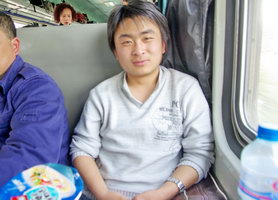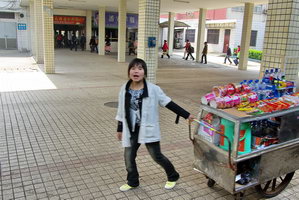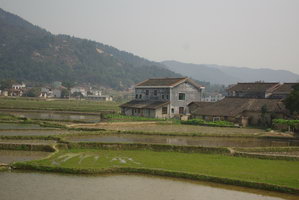On a Hard Seat Coach from Wuhan to Changsha
I was on the train to Changsha (Hunan) from Wuhan (Hubei) and chose to travel “hard seat” this time.
 Across from me was a university student. He watched me do Sudoku—the addictive number game that is an alternative (at least for us Westerners) to crossword puzzles. I explained my puzzle strategy, and allowed him to work his first puzzle. Only later, reading the fly-leaf in my puzzle book, did he discover that these puzzles are not a Western invention.
Across from me was a university student. He watched me do Sudoku—the addictive number game that is an alternative (at least for us Westerners) to crossword puzzles. I explained my puzzle strategy, and allowed him to work his first puzzle. Only later, reading the fly-leaf in my puzzle book, did he discover that these puzzles are not a Western invention.
The train slowed; some passengers moved to the end of the coach. I asked my new friend, “Do you know the name of this town?” He informed me, “YueYang.”
Hmmm… Yes, I’d heard of it before. “So, I think we must have now left Hubei and are now in Hunan, right?”
Ahh… I’ve learned a few Chinese words, but not many. I sometimes smile when I think about my career as a teacher educator, and how I commonly stressed the value of rich experiences as a strategy for learning. So, here in China I had learned the meaning of Bei (north) and Jing (capital) to get Beijing and, likewise, I understood that Nanjing was the southern capital in China. Yes, very elementary, I know. And having travelled previously to both of these cities, I sometimes joke about how expensive my language learning can be!
Later, I had a further lesson also. Here we were, very close to the big lake (Hu) from which the Province of Hunan (south of the lake) and Hubei (north of the lake) get their names. (The name of the lake is DongTing… which happens to be the birthplace of dragonboat racing. But that is another story.
 I confirmed all of this with my train friend as I watched out the window, and chose to shoot a photo of the train station when we arrived. I knew I had a friend in Changsha who came from this town. Would she recognize the station from my photo? Ahh… it was an idea I would try… just for fun. For me, there was nothing about the station that gave me a clue to its location.
I confirmed all of this with my train friend as I watched out the window, and chose to shoot a photo of the train station when we arrived. I knew I had a friend in Changsha who came from this town. Would she recognize the station from my photo? Ahh… it was an idea I would try… just for fun. For me, there was nothing about the station that gave me a clue to its location.
The fact is, there were almost no signs I could read when I travel by rail. Unlike air travel where announcements are made in both Chinese and English and most signs are in both languages, rail travel is different.
So, I enjoyed making friends along the way. I might try asking some very basic questions like, “Would you mind telling me when we are getting close to Changsha? I need to get off there.” If I can make my questions understood, people are always helpful. Few foreigners ride the trains. On this day, I was quite sure I was the only European face to be seen. Maybe just one in a thousand today.
Zhi Yong is an engineering student returning back from some travel to Shandong Province. We exchanged e-mail addresses. He seemed to enjoy chatting with me and kept apologizing for his weak English. In turn, I much enjoyed chatting with him, and apologized for my non-existent Chinese.
 In fact, the “hard-seat” travel choice had some interesting advantages this day. I was chatting with more people than I would normally do in the “soft-seat” coaches. Yes it was crowded–over-booked, in fact. That was a surprise to me. People with no assigned seats stood in the aisle or slouched on the floor in those exit areas at the end of the coaches. It didn’t happen that way in the upper-scale coaches.
In fact, the “hard-seat” travel choice had some interesting advantages this day. I was chatting with more people than I would normally do in the “soft-seat” coaches. Yes it was crowded–over-booked, in fact. That was a surprise to me. People with no assigned seats stood in the aisle or slouched on the floor in those exit areas at the end of the coaches. It didn’t happen that way in the upper-scale coaches.
And people watched me, too–the foreign guy with too much luggage and with the camera slung over his shoulder. From time to time I heard someone say “janada” (the common way that Chinese people pronounce Canada). Yes, my first attempts to talk to seat mates had been overheard, and the word had spread the length of the coach.
Zhi Yong did his first Sudoku puzzle perfectly on his first try that day. Yes, it did not really surprise me. I have learned to respect the diligence and perseverance of Chinese students.
I will choose to keep in touch with Zhi Yong. Maybe our paths will cross again sometime. Such things are part of my experience as a retired guy who enjoys travel in China.
Meanwhile, I’ll put a link in the sidebar to my favorite on-line Sudoku puzzles.
Photos here…
1) My new friend whom I met on the train.
2) A shot of the train station at YueYang, Hunan Province.
3) A shot of the countryside just a little south of YueYang.
Originally posted Thursday, May 7, 2009, by Professor Ron
Latest update: 09/11/14